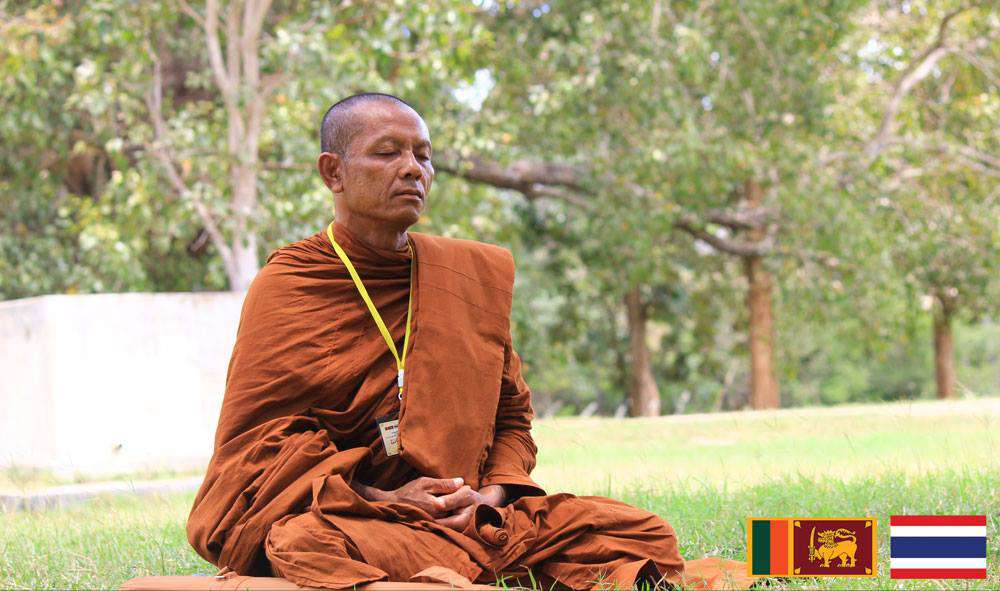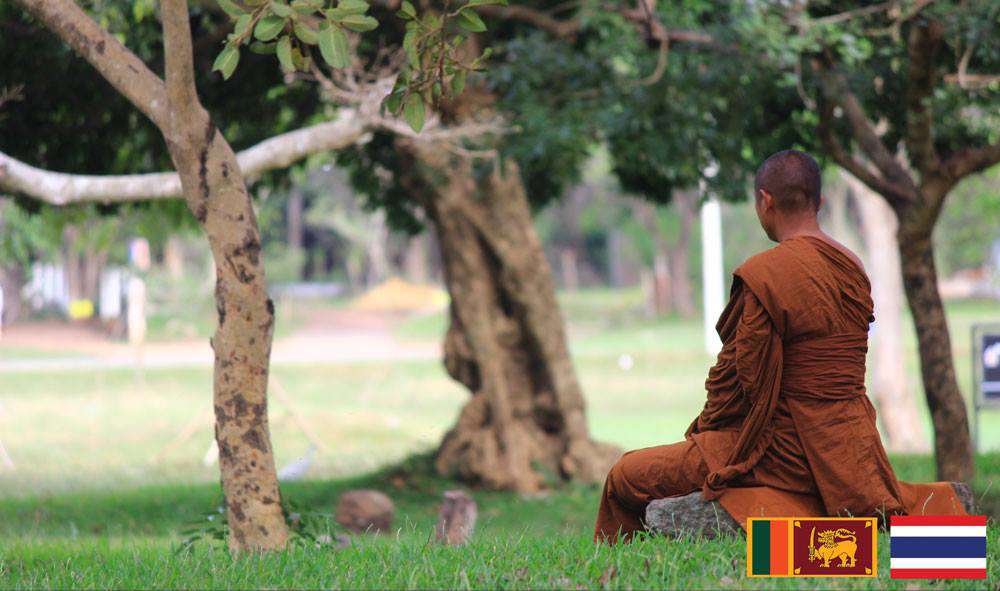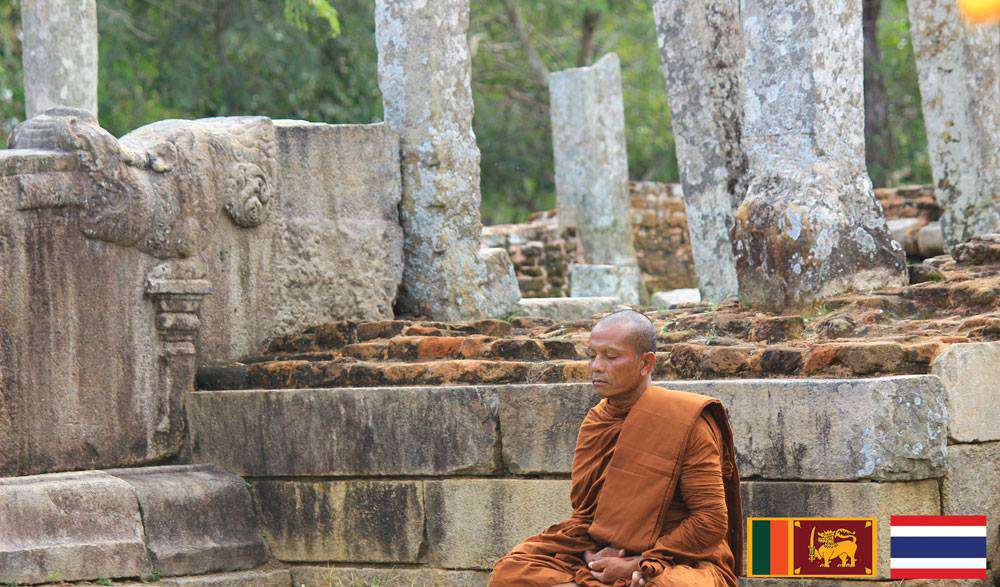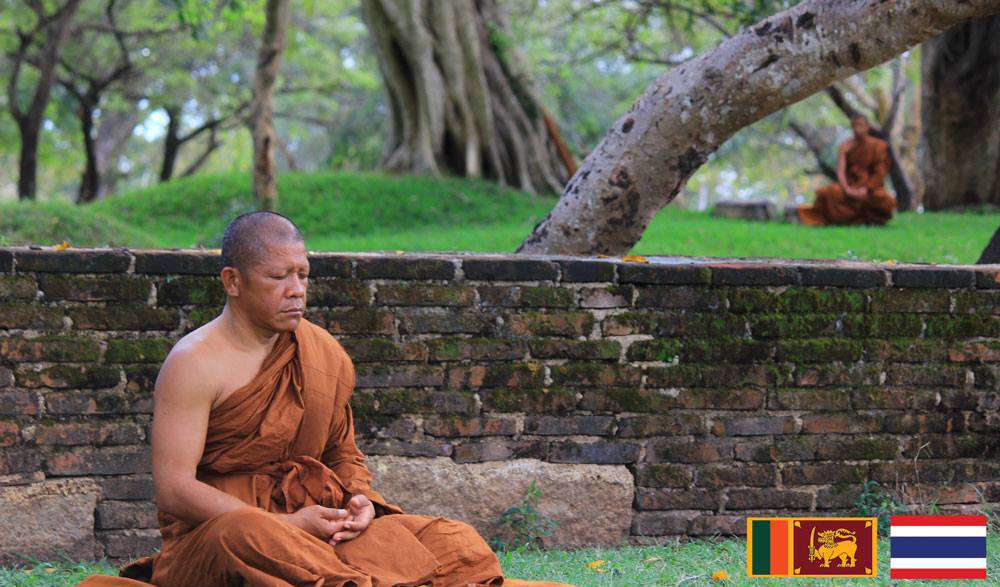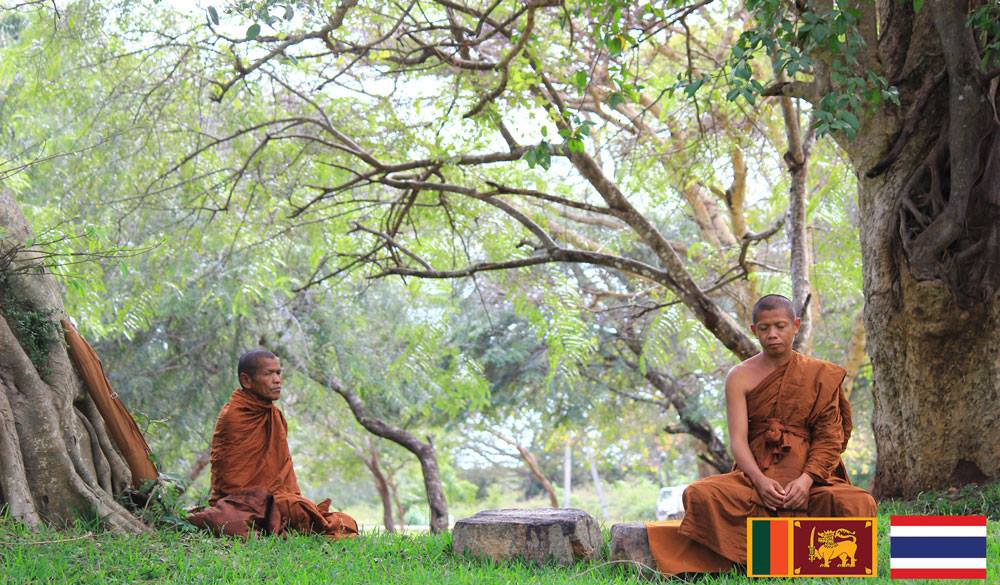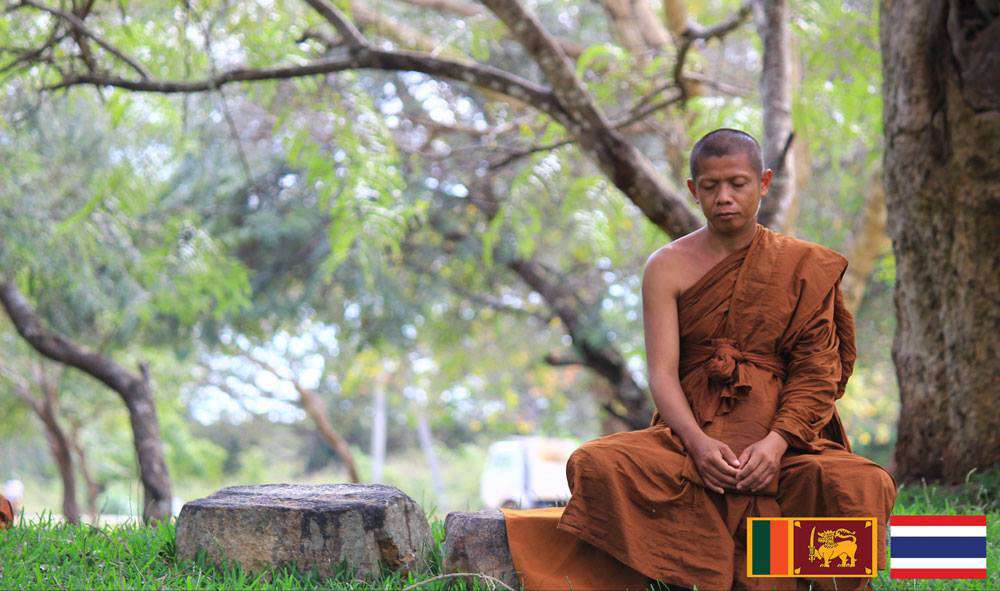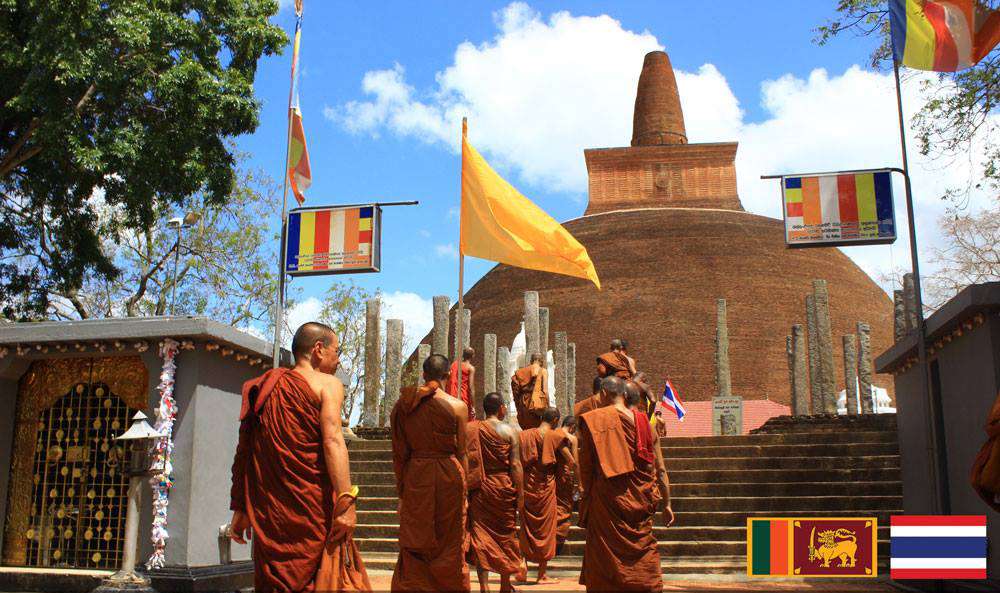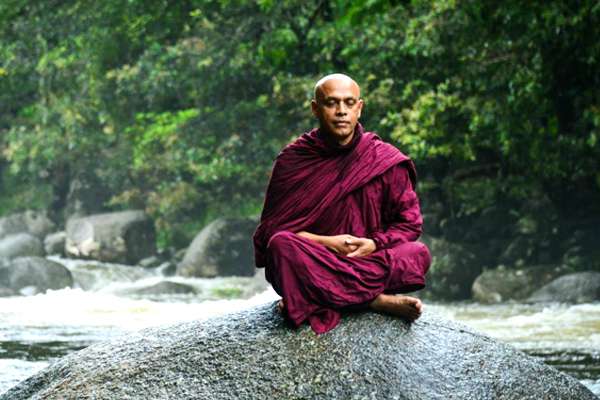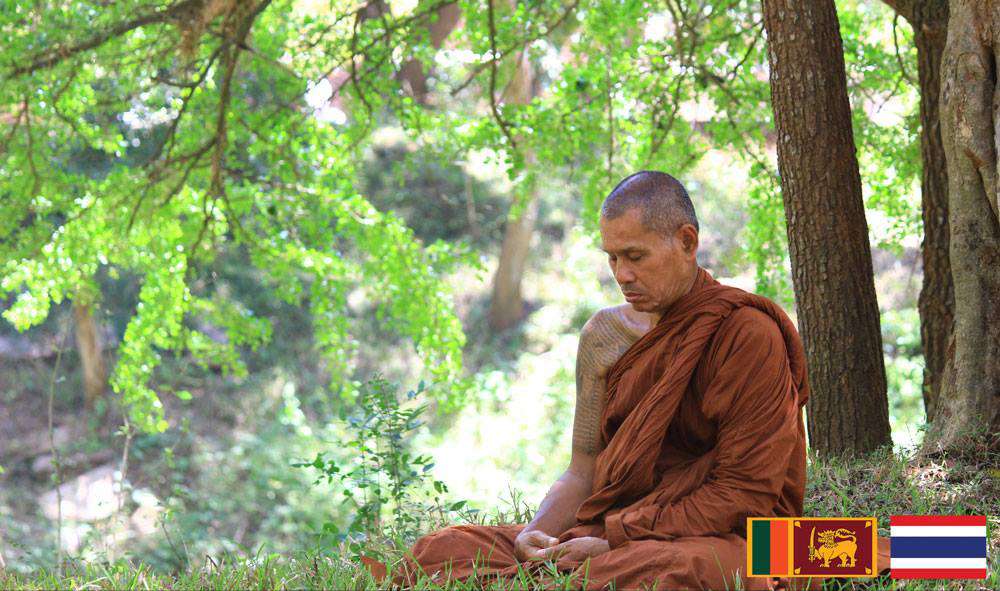Uddeso: Introduction
Evaṁ me sutaṁ: / Ekaṁ samayaṁ bhagavā / kurūsu viharati, kammāssadammaṁ nāma kurūnaṁ nigamo./ Tatra kho bhagavā bhikkhū āmantesi,/ bhikkhavo’ti. / Bhadante’ti te bhikkhu bhagavato paccassosuṁ./ Bhagavā etadavoca:/
“Thus have I heard. On one occasion • the Blessed One was living in the Kuru country, • in the town of Kammāsadamma of Kuru people.“There the Blessed One addressed the monks saying, “Monks.” “Bhante,” the monks replied to the Blessed One. • Then the Blessed One said this:
Ekāyano ayaṁ bhikkhave maggo,/ sattānaṁ visuddhiyā,/ sokapariddavānaṁ samatikkamāya,/ dukkhadomanassānaṁ atthaṅgamāya,/ ñāyassa adhigamāya,/ nibbānassa sacchikiriyāya./ Yadidaṁ cattāro satipaṭṭhānā./ Katame cattāro?/
“Monks, this is the one and only path • for the purification of beings, • for the overcoming of sorrow and lamentation, • for the disappearance of pain and grief, • for the attainment of the higher knowledge, • and for the realization of Nibbāna. “Namely, the four establishments of mindfulness. What are the four?
Idha bhikkhave, bhikkhu / kāye kāyānupassī viharati./ Ātāpī, sampajāno, satimā,/ vineyya loke abhijjhādomanassaṁ./
Here, monks, a monk dwells contemplating the body in body, • dedicated, fully aware, and mindful, • having put away greed and grief for the world.
Vedanāsu vedanānupassī viharati,/ ātāpī, sampajāno, satimā,/ vineyya loke abhijjhā domanassaṁ./
“He dwells contemplating the feelings in feelings, • dedicated, fully aware, and mindful, • having put away greed and grief for the world.
Citte cittānupassī viharati,/ ātāpī, sampajāno, satimā,/ vineyya loke abhijjhā domanassaṁ./
“He dwells contemplating the mind in mind, • dedicated, fully aware, and mindful, • having put away greed and grief for the world.
Dhammesu dhammānupassī viharati,/ ātāpī, sampajāno, satimā,/ vineyya loke abhijjhā domanassaṁ./
“He dwells contemplating the phenomena in phenomena, • dedicated, fully aware, and mindful, • having put away greed and grief for the world.
1.1 Ānāpāna Pabbaṁ: Section on Breathing
Kathañca bhikkhave bhikkhu kāye kāyānupassī viharati?/
“How, monks, does a monk dwell contemplating the body in body?
Idha bhikkhave bhikkhu/ araññagato vā rukkhamūlagato vā suññāgāragato vā/ nisīdati pallaṅkaṁ ābhujitvā,/ ujuṁ kāyaṁ paṇidhāya/ parimukhaṁ satiṁ upaṭṭhapetvā./ So sato’va assasati,/ sato’va passasati./ Dīghaṁ vā assasanto, dighaṁ assasāmīti pajānāti./ Dīghaṁ vā passasanto, dīghaṁ passasāmīti pajānāti./ Rassaṁ vā assasanto, rassaṁ assasāmīti pajānāti./ Rassaṁ vā passasanto, rassaṁ passasāmīti pajānāti./
Here monks, a monk, gone to the forest or to the foot of a tree • or to a secluded place, • sits down folding his legs crosswise, • holding his body straight, • and setting mindfulness on the meditation object. “Mindful he breathes in, mindful he breathes out.“When breathing in a long breath, he knows, • ‘I am breathing in a long breath.’ When breathing out a long breath, he knows, • ‘I am breathing out a long breath.’“When breathing in a short breath, he knows: • ‘I am breathing in a short breath.’ When breathing out a short breath, he knows: • ‘I am breathing out a short breath.’
Sabbakāya paṭisaṁvedī assasissāmīti sikkhati,/ sabbakāya paṭisaṁvedī passasissāmīti sikkhati./ Passambhayaṁ kāya saṅkhāraṁ assasissāmīti sikkhati,/ passambhayaṁ kāya saṅkhāraṁ passasissāmīti sikkhati./
“‘Conscious of the entire breathing process, I shall breathe in,’ • thus he trains himself. Conscious of the entire breathing process, I shall breathe out,’ • thus he trains himself. “‘Calming the entire breathing process, I shall breathe in,’ • thus he trains himself. ‘Calming the entire breathing process, I shall breathe out,’ • thus he trains himself.
Seyyathāpi, bhikkhave, dakkho bhamakāro vā bhamakārantevāsī vā/ dīghaṁ vā añchanto, dīghaṁ añchāmīti pajānāti./ Rassaṁ vā añchanto, rassaṁ añchāmīti pajānāti./
“Just as monks, a skilled turner or his apprentice, • when making a long turn, understands, • ‘I am making a long turn,’ • or when making a short turn understands, • ‘I am making a short turn.’
Evameva kho bhikkhave, bhikkhu/ dīghaṁ vā assasanto, dīghaṁ assasāmīti pajānāti./ Dīghaṁ vā passasanto dīghaṁ passasāmīti pajānāti./ Rassaṁ vā assasanto rassaṁ assasāmīti pajānāti./ Rassaṁ vā passasanto rassaṁ passasāmīti pajānāti./
In the same way monks, • when breathing in a long breath, the monk knows, • ‘I am breathing in a long breath.’ When breathing out a long breath, he knows, • ‘I am breathing out a long breath.’ When breathing in a short breath, he knows, • ‘I am breathing in a short breath.’ When breathing out a short breath, he knows, • ‘I am breathing out a short breath.’
Sabbakāya paṭisaṁvedī assasissāmīti sikkhati./ Sabbakāya paṭisaṁvedī passasissāmīti sikkhati./ Passambhayaṁ kāyasaṅkhāraṁ assasissāmīti sikkhati,/ passambhayaṁ kāyasaṅkhāraṁ passasissāmīti sikkhati./
‘Conscious of the entire breathing process, I shall breathe in,’ • thus he trains himself. ‘Conscious of the entire breathing process, I shall breathe out,’ • thus he trains himself. ‘Calming the entire breathing process, I shall breathe in,’ • thus he trains himself. ‘Calming the entire breathing process, I shall breathe out,’ • thus he trains himself.
Iti ajjhattaṁ vā kāye kāyānupassī viharati./ Bahiddhā vā kāye kāyānupassī viharati./ Ajjhatta bahiddhā vā kāye kāyānupassī viharati./
“In this way he dwells contemplating his own body, • he dwells contemplating others’ bodies, • and he dwells contemplating both his and others’ bodies.
Samudaya dhammānupassī vā kāyasmiṁ viharati./ Vaya dhammānupassī vā kāyasmiṁ viharati./ Samudaya vaya dhammānupassī vā kāyasmiṁ viharati./
“He dwells contemplating the arising of the body, • he dwells contemplating the passing away of the body, • and he dwells contemplating the arising and passing away of the body.
Atthi kāyo’ti vā panassa sati paccupaṭṭhitā hoti./ Yāvadeva ñāṇa mattāya, patissati mattāya,/ anissito ca viharati./ Na ca kiñci loke upādiyati./
“Mindfulness, that there is a body • is simply established in him • to the extent necessary for higher knowledge and mindfulness. He dwells independent, and not clinging to anything in the world.
Evampi kho bhikkhave bhikkhu / kāye kāyānupassī viharati./
That is how monks, a monk dwells contemplating the body in body.
OTHE PAGES - Sathipattana






